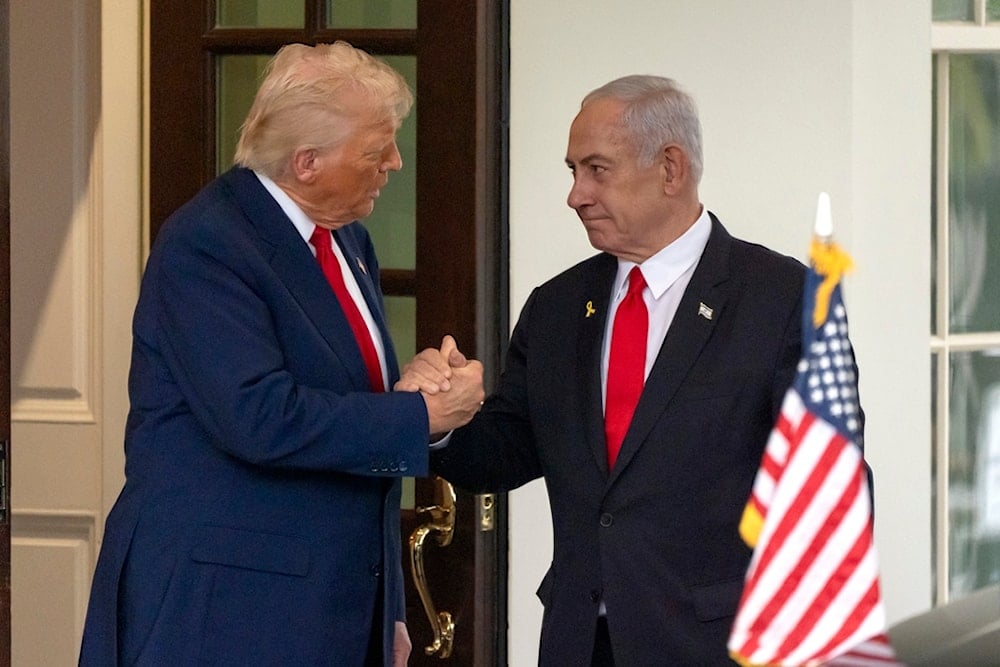Trump, Netanyahu ties strained over disputes on Gaza, Iran: NBC News
Trump and Netanyahu are at odds over their strategies on Iran and Gaza, exposing deep rifts as Washington seeks diplomacy and "Israel" seeks military escalation.
-

President Donald Trump, left, shakes hands with Israeli Prime Minister Benjamin Netanyahu as he leaves the West Wing of the White House, Monday, April 7, 2025, in Washington. (AP)
Tensions are escalating between US President Donald Trump and Israeli Prime Minister Benjamin Netanyahu as strategic differences emerge over how to manage the regional fallout from the war on Gaza and the tensions with Iran, NBC said Sunday in an exclusive report.
While both leaders entered the year in close alignment, NBC noted that their relationship was now showing clear signs of strain over the future of Gaza, nuclear negotiations with Tehran, and Washington’s military posture in the region.
Differing opinions on region's future
According to multiple US and Middle Eastern officials familiar with the matter, Trump and Netanyahu no longer see eye-to-eye on core regional issues. Netanyahu is currently pushing for a more aggressive, military-centric approach, including direct strikes on Iran’s nuclear facilities. Trump, on the other hand, is pivoting toward diplomacy and engaging in nuclear talks with Iran.
The shift has led to mounting frustration in Tel Aviv. Netanyahu was reportedly blindsided by several recent moves from the Trump administration, NBC revealed, including the decision to halt the US military campaign against Ansar Allah in Yemen after the group stopped firing on American ships.
This occurred despite a recent Ansar Allah missile landing near Ben Gurion Airport in occupied Palestine. Israeli officials interpreted the US withdrawal as a signal that they would be left to deal with any possible regional threats by themselves.
Privately, Netanyahu was also angered by Trump’s public comments on Iran. In a recent interview, Trump said he had not yet decided whether Iran would be allowed to retain uranium enrichment capabilities for civilian purposes as part of an emerging nuclear deal.
'Israel' going against US wishes
The ambiguity alarmed Tel Aviv, which firmly opposes any deal that allows Tehran to enrich uranium at any level. Israeli Strategic Affairs Minister Ron Dermer conveyed these concerns directly to Trump’s Middle East envoy, Steve Witkoff, in a meeting at the White House, as per the report.
For Trump, Netanyahu’s decision to launch a renewed military offensive in Gaza represents a departure from his vision for a stable postwar transition. He sees the offensive as counterproductive and believes it could complicate efforts to implement a broader political and economic plan to rebuild the territory. According to two sources familiar with Trump’s thinking, the president has described the new assault as a “wasted effort” that undermines momentum toward reconstruction and de-escalation.
Meanwhile, according to NBC, the US is allegedly pressing both "Israel" and Hamas to agree to a ceasefire, and these efforts are part of ongoing diplomatic engagements between Dermer and Witkoff in Washington.
The disagreement, according to NBC, goes back to the fact that Netanyahu views this as a moment to capitalize militarily, while Trump envisions a geopolitical opening to recalibrate US influence in the region through diplomacy.
The contentious issue of Iran
Nowhere is this divide clearer than in their differing positions on Iran. Netanyahu has been lobbying for US support of military strikes on Iranian nuclear infrastructure, arguing that recent regional dynamics have made such a move more feasible.
Trump, meanwhile, is focused on sealing a deal to prevent Iran from acquiring a nuclear weapon, a sharp shift from the earlier stance of “maximum pressure” during his first term. However, this change has drawn criticism not just from Netanyahu but also from US lawmakers.
Republican Senators Tom Cotton and Lindsey Graham have urged the administration to submit any nuclear agreement with Iran to the Senate for ratification and warned that any deal allowing uranium enrichment is unacceptable.
Despite the pressure, Trump’s team remains engaged in backchannel diplomacy. A third US official confirmed that negotiations are ongoing and that the White House has been providing updates to Israeli officials.
A cynical Netanyahu risks US ties?
Netanyahu reportedly told aides that Iran would never adhere to the terms of any agreement and that a deal would simply buy Tehran time to rebuild. According to the report, Israeli officials also fear that the US overtures could undercut the pressure that has been building on Iran due to sanctions and setbacks suffered by its allies across the region.
The political dynamics between the two leaders are further complicated by domestic factors. Netanyahu is constrained by his right-wing coalition and his support base, which broadly favors Trump. Publicly opposing the US president could fracture Netanyahu’s fragile political alignment, something analysts say the prime minister cannot afford.
Trump is currently navigating his own geopolitical landscape. He is set to visit Saudi Arabia, Qatar, and the United Arab Emirates next week to consolidate support for his postwar regional framework. Notably, "Israel" is not included in his itinerary, a decision that many observers see as a sign of the cooling ties between the two allies.

 5 Min Read
5 Min Read










